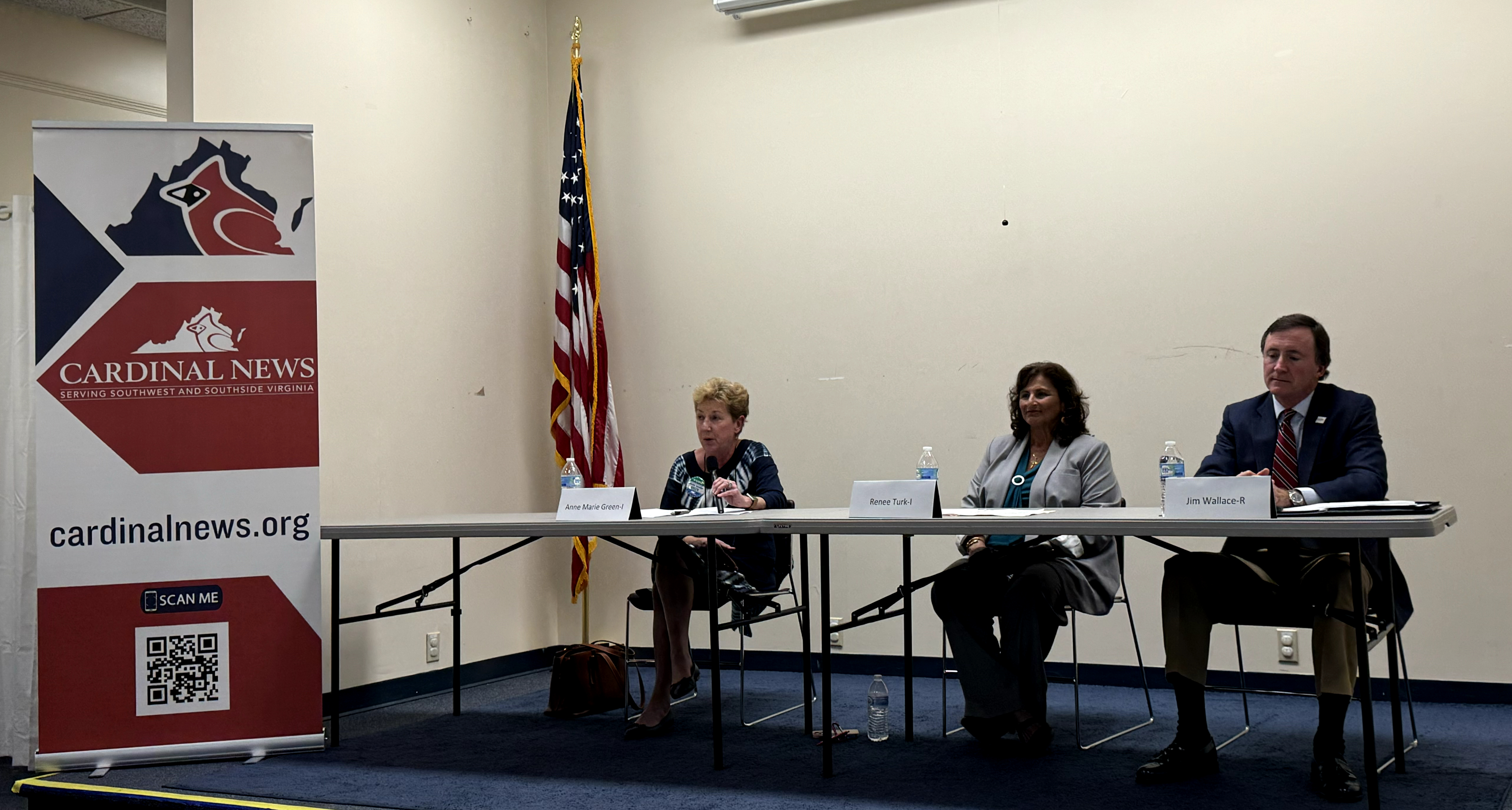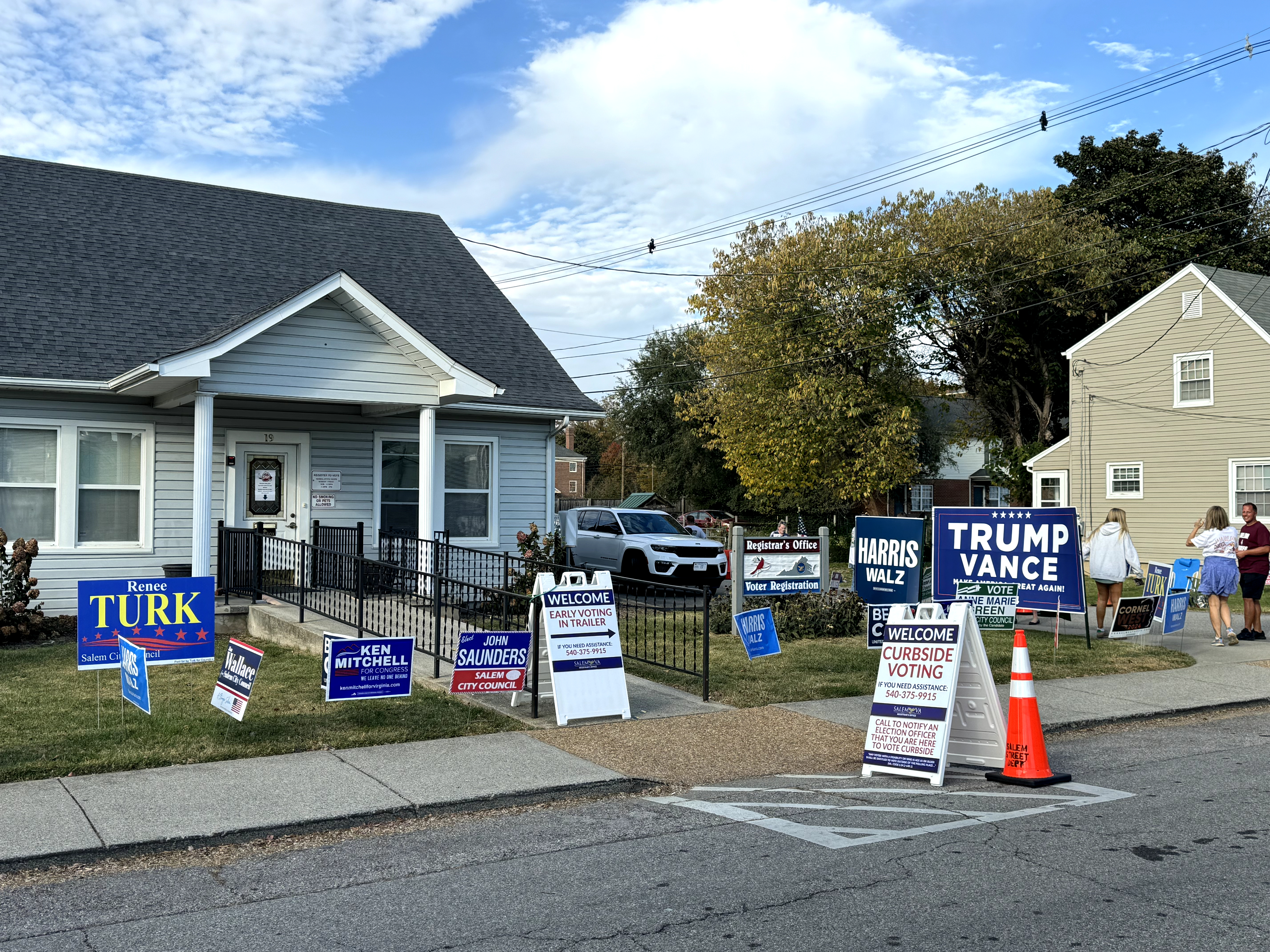Just days before Election Day, conversations continue about a controversial rezoning of 32 acres of the HopeTree Family Services property in Salem, previously known as the Virginia Baptist Children’s Home.
HopeTree submitted another zoning application in August. In the rezoning narrative document, the company claims this is due to litigation filed after the rezoning was approved in June. Five plaintiffs sued the city over the rezoning, mostly on grounds of improper procedure. Four plaintiffs are married couples, meaning three total neighboring households filed suit.
“HopeTree is now aware of allegations of procedural concerns with the rezoning approval process from the previous rezoning application that HopeTree filed on December 1, 2023 … HopeTree does not wish for any uncertainties surrounding the procedural processes to detract from its efforts on behalf of those HopeTree serves,” the document reads.
On June 24, Salem City Council approved a rezoning from residential single-family zoning to a planned unit development — allowing for the construction of up to 28 more commercial uses on 32 acres of HopeTree’s land that they’re looking to sell to a developer.
Chris Dodd, director of communications for HopeTree, has not responded to inquiries as to whether or not the sale has been finalized.
Uses allowed under the rezoning include camps, cemeteries, religious assembly buildings, athletic instruction services, convenience stores, and daycare centers. HopeTree sits in the middle of a residential neighborhood.
This conversation isn’t new. The HopeTree rezoning application was submitted in November 2023. The hearings were continued until the matter was finally approved in April with a 3-2 vote in the planning commission and later in June by city council with a 3-2 vote on both the first and second readings on June 10 and June 24.
Renee Turk, Randy Foley and Bill Jones voted in favor of the rezoning. Hunter Holliday and Jim Wallace voted against it. Turk and Wallace are both on the ballot for three open city council seats in the upcoming election.
According to the application narrative, the new application from HopeTree is “substantially similar” to the original that was filed in December, with minor changes such as the owner name listed in the documents.
HopeTree said in their application narrative they’re requesting the City of Salem “ordain, reordain, amend, reamend, adopt and/or readopt” the zoning code that has already been passed.
This new application, with mostly minor changes in wording, will lead to a public hearing prior to a new vote.
Wallace said during the Cardinal News candidate forum Tuesday night that the council had “compressed” the schedule. 
“Somebody’s hitting the accelerator,” he said after the forum. “It’s not the normal process we will follow.” When asked after the forum, he said he thought it was Mayor Renee Turk who was trying to rush it.
‘Absolutely not’ rushing: Joint public hearing scheduled for Nov. 13
There will be a joint public hearing with council and the planning commission on Nov. 13, rather than two separate hearings. With this, Wallace said the public is losing an opportunity to “have their voice heard.” The joint hearing also speeds up the process by two weeks.
In an email, Renee Turk said the public has had “many opportunities” to share concerns — 44 spoke on the HopeTree rezoning during a Feb. 14 public hearing, she said; 36 of these speakers were in opposition.
“Everyone that wanted to speak, did,” she said.
Having a combined public hearing, Turk said, is “absolutely not” rushing the process. “The public hearings were already held throughout the process, the issues and concerns have been voiced and set out in a lawsuit,” she said. “It is to accommodate a procedural error, not an error in the voting. And it should help expedite the lawsuit which is good for everyone.”
She also said she believes the current council should finish this process, as they’ve studied the development over the past two years. “All three candidates have publicly stated in four forums that they would vote no — because they want to be elected,” she said. Along with the two incumbents, Anne Marie Green and John Saunders are running for the three open council seats.
Mike Stevens, director of communications for the city of Salem, said there are usually two opportunities to speak, along with “citizen comment periods” during meetings, which were recently introduced into the regular agendas.
He said for 10 months prior to the public hearing that led to the rezoning approval vote, from August 2023 until May 13, 2024, citizens occupied 29 speaking spots to talk about HopeTree.
Ongoing political debate and a suit against the city council
Five plaintiffs have brought suits against the city council and HopeTree Family Services: Terry Langfitt, Ashleigh Langfitt, Paul Dotson, Carol Dotson, and Carl Hart. Paul Dotson said the suits will be combined once they go to court. All of the plaintiffs are homeowners to properties abutting HopeTree, except Carl Hart, who is a homeowner across the street.
As of now, there is no date set for a hearing. Jim Guynn, attorney for the city of Salem, said the plaintiffs have not yet asked for a hearing.
When asked, Dotson said the plaintiffs are “ready to go to court.”
The main concerns that are listed in the suit are somewhat similar to those in a lawsuit filed against Roanoke City Council for their zoning changes that eliminated exclusionary housing — improper and illegal procedure, failure to notify citizens correctly, decision-making based on insufficient data and a development plan that won’t match the neighborhood’s characteristics.
Dotson’s suit states that findings from a traffic study conducted by Balzer & Associates, an independent engineering firm that HopeTree retained, were “fundamentally incorrect” and that the firm later “noted several deficiencies.”
It states required notices were published in the Salem-Times Register for a planning commission public hearing on Jan. 10 and a city council public hearing on Jan. 22, as is required. These early hearings were then continued without a vote.
The suit then states that in later public hearings — a planning commission hearing in April and two city council hearings in June — notices were not published.
Megan Rhyne, executive director for the Virginia Coalition for Open Government, said she’s not entirely sure what the law is on requiring notice for a public hearing that has been continued.
“It would certainly make sense that the public be made aware of these types of decisions,” she said.
Guynn said the plaintiffs arguing they didn’t get a letter of notice for public hearings “waive that argument” if they do show up at the hearing, which he said some of them did.
John Fishwick, the plaintiffs’ attorney, said he cannot comment on the ongoing litigation.
Dotson said he has no concerns with new housing going into the HopeTree land. He’s concerned about solely the commercial development — and said the development allowed would be “detrimental” to Salem. He’s worried about the value of his property depreciating and safety concerns with construction vehicles coming up the roads near HopeTree.
With this, he voted early in this election, and said he votes “every chance [he] can get.”
Are more people in Salem voting because of this controversy? It’s still unclear.
It’s unclear whether the controversy and unrest surrounding the HopeTree rezoning from the summer will have a large effect on voter turnout in Salem.
As of Monday, Salem has already counted 6,120 votes through the machine and returned mail-in ballots. Oliver said the city is still waiting for 408 mail-in ballots to be returned. That’s about a 34% turnout, a week from Election Day.
According to Dana Oliver, director of elections in Salem, 7,148 votes were cast for city council in 2022 — a turnout of about 40%. The prior city council election, 2020, saw an 18% turnout with 4,888 voters.
That being said, this year is the first time the council elections have coincided with the presidential election. 2022 was not a presidential election year, and in 2020 and years prior, local elections happened in May.
This could be bringing more voters to a local election than in previous years. 
Salem elections haven’t had an issue this contested in front of an election in a while, not any that Nancy Reynolds remembers. She’s lived in Salem since she was eight years old. She’s in her 60s now. Salem is a town of “unique culture,” and she wants it to stay that way.
“If you look at the census figures, Salem has been growing by about 2% every year, which is not a huge amount, but we don’t want to be Brooklyn, right?” she said. “We want to preserve what we have here.”
Cardinal News previously reported that Salem’s population is down 1.4% since 2020, mostly due to a larger number of residents dying than being born.
Reynolds lives in a home that abuts the HopeTree development. “We are extremely concerned,” she said of herself and her neighbors. She’s worried the value of her homes will drop as a result of the new developments.
Reynolds is an attorney, but she’s not involved in her neighbors’ suit as an attorney nor as a property owner, she said, because she had a conflict of interest with the firm she was with at the time it came about.
She said she is not opposed to affordable housing, and she does think that Salem needs to attract jobs and businesses, but she’s concerned about new businesses competing with those on Main Street — different kinds of businesses could accomplish this without harming Main Street, she said.
She said she knocked on the doors of abutting property owners to HopeTree, and they didn’t know about the process in the planning commission and council.
Reynolds said she always votes early. This year, she said she voted “for the people who would vote against the [planned unit district zoning], and that is not Renee Turk.”



